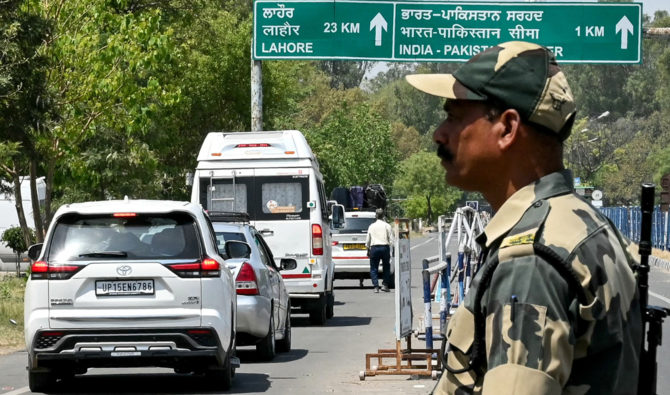ISLAMABAD: Prime Minister Shehbaz Sharif on Wednesday urged US Secretary of State Marco Rubio to impress upon New Delhi to “act responsibly” amid fears of a military confrontation breaking out between nuclear-armed neighbors India and Pakistan.
Tensions have surged between the two countries following a deadly attack on tourists in Indian-administered Kashmir on Apr. 22 that New Delhi has said Pakistan was involved in. Islamabad denies the charges and has said it will participate in any credible and transparent investigation of the assault.
Several countries such as China, Saudi Arabia, Iran, UK, US and others have called upon both India and Pakistan to exercise restraint and avoid a military confrontation. Pakistan has vowed to give a “strong” response to any aggression after Indian Prime Minister Narendra Modi gave the military freedom to respond to the Kashmir attack during a closed-door meeting on Tuesday.
Sharif received a call from Rubio during which he offered the American official Pakistan’s perspective on the recent developments after the Apr. 22 attack, the Prime Minister’s Office (PMO) said in a statement.
“He [Sharif] categorically rejected Indian attempts to link Pakistan to the incident and pointed to his call for a transparent, credible, and neutral investigation to bring out the facts,” the PMO said.
“He urged the US to impress upon India to dial down the rhetoric and act responsibly.”
Sharif condemned “terrorism” in all its forms and manifestations and underscored Pakistan’s leading role in the “war against terror,” the statement said.
He described India’s recent behavior as “deeply disappointing and worrisome,” saying it would only serve to distract Pakistan from its ongoing efforts to defeat militants, particularly those based in Afghanistan.
India and Pakistan have fought two out of three wars since 1947 over the issue of the disputed Himalayan territory of Kashmir. Both countries claim Kashmir in full but administer only parts of it.
“The Prime Minister emphasized that peaceful resolution of the Jammu & Kashmir dispute was the only way to ensure lasting peace in South Asia,” the PMO said.
On bilateral cooperation, Sharif told Rubio there were several areas where both sides could cooperate. He cited counterterrorism and enhanced economic cooperation, “particularly the minerals sector.”
“Secretary of State Rubio thanked the Prime Minister for the detailed conversation and emphasized the need for both sides to continue working together for peace and stability in South Asia,” the statement said.
Earlier on Wednesday, fears of a military conflict were reignited when the state-run Pakistan Television (PTV) reported India had carried out “unprovoked” firing in the Kayani and Mandal sectors of the Line of Control on Tuesday night.
The LoC runs 742km (460 miles) dividing the parts of Kashmir governed by India and Pakistan, and acts as part of the de facto border between the two countries.
Small arms were used by the Indian forces, prompting Pakistan to respond, PTV said.
“There are also reports that multiple enemy posts were destroyed by the Pakistan Army’s effective response,” PTV said, naming one of them as the Chakpathra post.
Earlier on Wednesday, the state-run Associated Press of Pakistan reported that a “timely” response by the Pakistan Air Force (PAF) had “forced” four Indian Rafale jets to retreat after payrolling near the two nations’ de facto border.
“On the night of April 29/30, four Indian Rafale jets conducted patrolling within Indian geographical boundaries” near the LoC, APP reported, saying PAF “immediately” detected the jets.
“A timely and swift response by the Pakistan Air Force forced four Indian Rafale jets to retreat … The Pakistani armed forces remain fully prepared and alert to give a befitting response to any aggression from India.”
















